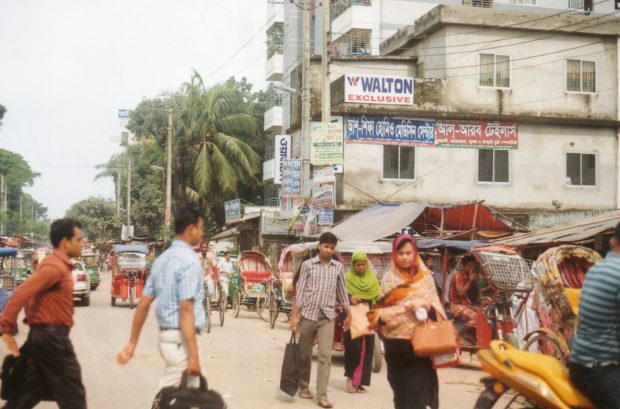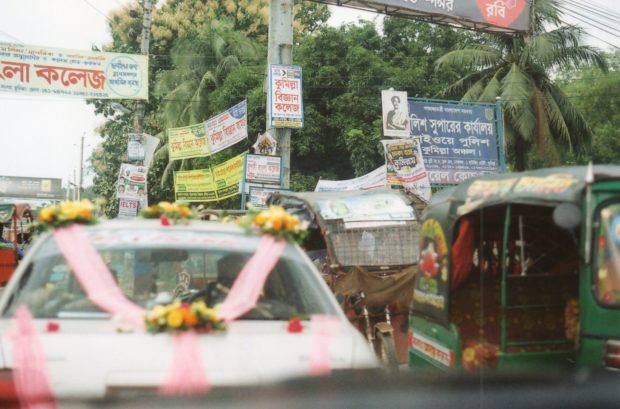You have no items in your cart. Want to get some nice things?
Go shopping
I have so far spent six hours of my brief time here in a car. I am a virtual prisoner here: it is many years too late to protest, to enfranchise myself with the tools I can use so effectively six hours’ time difference to the West. The main tool I lack is language. I lack the ability to engage, whether to enjoy and participate or to rebel. Besides, I’m not sure the will is there; it would be a waste of a revolution, I’ll spend fewer than two weeks here this decade.
The time in transit is my only opportunity to see the country where I was born. My understanding of place comes from snippets overheard in conversations in which I am not invited to participate and from what I see on the roads. I have noticed the labyrinthine alleys around my grandmother’s house lose their potholes and neaten over the years. It can now accommodate a single car length, and there are no longer open sewers. It has adapted to encompass the rising number of car owners; there is a garage on the bottom floor of a block of flats around the corner with whom the drivers of the area have an informal parking arrangement. These are the cars that later block up the roads in traffic that makes a five-mile journey take two, three hours if you travel at the wrong time, as we did.
The traffic has persisted, steadfast against the planning decisions that have been taken to reduce it. I observe the widening of the roads, the increased police enforcement; the new flyovers intended to create another way, and all of its inefficacy. I use the time sat in traffic to read the road signs, the closest activity I have to partaking in the metropolitan life that must exist around me, to which I have never been witness. The signs sit upon painted rectangles of metal, block colour with white lettering the most common. Some are electrified in muted neon, to counterbalance the lack of street lighting. Initially, the typography strikes me as the same, unfamiliar as I am with the Aramaic characters. But I am wrong, the lettering can be rounded or angular, it can be italicised. Graphic design may be in its relative infancy here, but there is a concept of tacky in Bengali too.
I learn a number of things from the signs: I am still able to read them, having learnt the characters on a pre-pubescent trip where we used to stay for what felt like the whole six weeks of summer, rather than the six days of now. I see most commonly the signs for pharmacies and universities, learning and illness being the preferred activities of this city. The most corporate signs I see are those for cement: Holcim appears to have been overtaken by Shah, with its red background and white lettering encasing the tollbooths of the recently reinforced Meghna bridge. They have the competitive advantage as creators of the highways and other structures – as well as a canvas, the newness of the structures are themselves an advertisement in a country where infrastructure is still a prime concern.
I was in double digits before I learnt to read these street signs, but now I can read but not speak. I am bemused by the incantations on the back of vehicles, praying either to God or a mother’s well wishes to avoid accident, instead of a regard for speed limits and lanes in the road. But often, I am unable to understand the sentence and merely read the words. I comprehend what a Bengali sounding word is, but not what it means. The words have escaped me, and more broadly, the language.
It is evident that I can’t speak it anymore, even though it was once all I could speak. I lack the nouns to help an illiterate stranger on the plane to complete a landing card and the cultural lexicon to speak to the family that I rarely see. Over time, as my non-communication has become more entrenched, they speak in my presence about me rather than to me. There is a cursory but affectionate “Are you well? Are you studying?” after which the questions are directed to my parents about my current state before descending into nostalgia for 20 years previously.
The anecdotes that are told hark back to a time when I could only speak that language, as if there’s a desire to hold onto that past version of me: more affectionate, feminine, Bengali. Even my parents’ stories remain limited to a time when I was two or three when I spoke with the same sing-song cadence and the almost head tilting lilting of speech that can be detected amongst not only Bengali girls, but women too. They’ve heard me speak it in a more straightforward, aggressive way but either that doesn’t count or the memory doesn’t remain.
Now, I utter only a few phrases, almost always in the negative – “I don’t need”, “I don’t know”, “I don’t want”. I can name foods, as they are the only words on which I have an opinion, but in my endeavour to be polite, I never ask for anything that I want nor do I refuse anything that I don’t. I have no response to anything other than that. Nodi (noh-dee) – in a country made up mainly of water, I only know one word for a body of it, to signify both river and sea. I don’t know what to say when my father says he misses his own; I don’t know if this is a failure of language or of compassion.

The content of exchanges is domestic: family, health, school. The structure is different, more fragmented somehow. I can’t form a question beyond those that I hear, but those that I hear taste foreign on my tongue. Perhaps shamefully, I’m not one to care about extended family, or to understand why someone else would be concerned about the distant branches of my own tree. I observe what seems like a verbal reel of the society pages where information (and only that, no opinions or ideas) is transacted on who has married, who has borne children (and what they study), who has died.
I haven’t been privy to anything longer or in depth than this. Even amongst my immediate family and the repeated interactions that I see, understood or observed facts and sentiments are spoken as if up into the air like the smoke of a cigarette, inviting no clear response although sometimes eliciting another member to exhale themselves. In this metaphor, I don’t know how to smoke and dawdle with the stick, occasionally passing it on as a baton to someone else but never inhaling myself. To an alien structure, add register: I don’t know which to use or the expectations of either intimacy or formality. Who to treat as family is a confusing question when everyone feels unfamiliar but there are some to whom you owe a debt of gratitude that you can’t remember accruing.
When we are in the home that I grew up in in the UK, my parents and I speak a hybrid that has evolved as a silo specific to our household. (I’m sure other immigrant households maintain their own strands.) Here, they abandon our bastard dialect and reacclimatise to that which they left almost 30 years ago. I perceive this in their phrasing, they speak more idiomatically. I hear them saying expressions they have no cause to use in the UK – they repeat the same sayings again and again like a child playing with a toy that they know will be taken from them soon. My mother takes the mouthpiece for me too: apparently, I said that my dad had started to seem old. She wheels this made up anecdote out for every new troop of perhaps-family that visit as if I said it during this trip. I didn’t – she has chosen it as the sentiment and phrasing are distinctly Bengali. I can’t remember when something so culturally fluent came to my lips organically.
Yet, there are glimpses of common ground – my grandparents sneaking off to the cinema, an activity proscribed by my grandfather’s mother, her own fearsome mother-in-law. She tells me something she read about why certain languages have certain intonations based on the temperature of the country in which it is spoken and consequently, how much its speakers have to open their mouths. This brought to my mind a fact in a similar vein about the Geordie accent sharing sounds with Scandinavian languages as it involves opening your mouth less. But I have no way to share this anecdote, and I have no way to share anything of myself. Learning a language feels like it’s about vocabulary, grammatical structures, cases. Losing a language is about realising you don’t fit the norms or have the words for the societal constructs to speak freely. You don’t translate.





Brilliant and eye opening piece. I’ve never thought how language could be so stultifying. Thanks Ari x